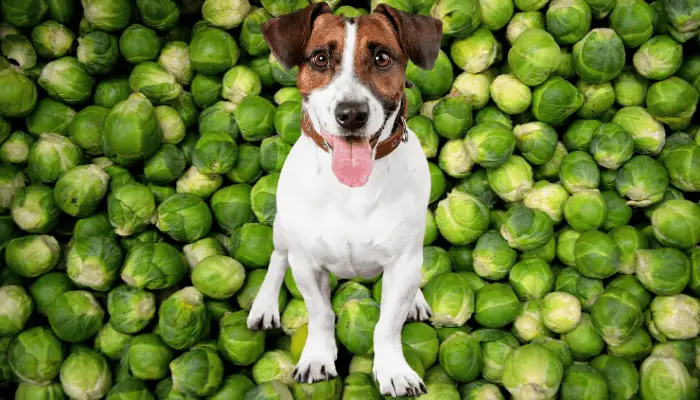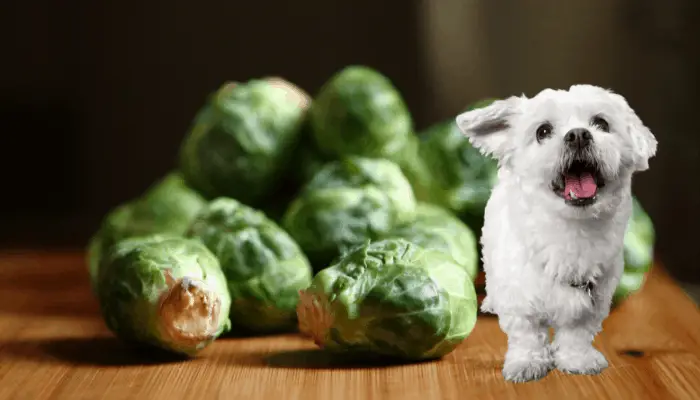
Your dog stares at your plate of Brussels sprouts with longing eyes every time, and you are never quite sure what to do? While Brussel Sprouts may not be everyone’s favorite vegetable, dogs aren’t as picky as we are when it comes to food – especially when they watch us helping ourselves to it. So whether or not you can share your meal with them depends on the all-important question “can dogs eat brussel sprouts?”
Brussel Sprouts are safe and highly beneficial to the health of your dog. Brussel Sprouts contain antioxidants, fiber, and vitamins necessary for keeping your dog’s health at an optimal level. As long as you feed them at a moderate level, your dog shouldn’t experience any side effects like flatulence and gastrointestinal challenges.
There are ways to maximize the fantastic benefits of Brussel Sprouts while reducing the possibility of risks to the lowest possible level in your dog. This is where precautions come in, and there are more than a few of them. In this article, you’ll also learn about what your dog has been missing out on without Brussel sprouts in its diet.
Are Brussel Sprouts Good for Dogs?
We all desire the very best for our pets, including vegetables. Every dog lover should know that the role of vegetables in the health of our dog extends far beyond balancing its diet. Vegetables like Brussel sprouts play a crucial role in determining how energetic, attractive, fit, and healthy our dogs will be.
With a moderate amount of Brussel sprouts, your dog will get to enjoy a wide array of nutrients, whose benefits cannot be overstated. Brussel sprouts are high in fiber, low in calories, and rich in antioxidants, amongst other things. While your dog enjoys the taste of a well-prepared brussel sprout treat, its health also receives a significant boost through the nutrients this vegetable supplies.
Nutrients in Brussel Sprouts
If your dog’s health truly matters to you, then calories are a crucial topic of discourse. They are a significant feature in the nutritional profile of any food that will land on your dog’s plate, including Brussel sprouts. Let’s see how many calories Brussel sprouts contain and what the health implications are for your dog:
For every 100g serving of Brussel sprouts that your dog consumes, 36 calories will be delivered to your dog’s body. Is this too much or just enough?
It is a fact that dogs require between 25 to 30 calories per pound every day. You can determine how many calories your dog should have every day by doing some simple arithmetic with this information. Better still, you can look up your dog’s pre-calculated daily calorie need.
Calorie requirements will vary from breed to breed as weight differs.
Other factors that influence your dog’s daily calorie requirement are its age if it is spayed or not, and its activity level. Older dogs require about 30% fewer calories than their younger counterparts; the same percentage applies to less active and spayed dogs.
For Brussel sprouts, delivering 36 calories for every 100g serving is, to say the least, impressive. The lower the calorie amount, the lower the need to worry about the dangers of exceeding the calorie requirement.
With Brussel sprouts, high-calorie content should be the least of your worries. The calorie content is moderate, making it highly suitable and safe to serve your dog.
Antioxidants in Brussel Sprouts
When the body carries out everyday activities such as the breakdown of food, some harmful chemicals are released. These chemicals are referred to as Free Radicals. If left unopposed, these free radicals will damage the cells of your dog’s body. Antioxidants are the ‘warriors’ that defend the body of your dog against these free radicals.
Brussel sprouts are endowed with an impressive supply of these antioxidants. The antioxidants from Brussel sprouts will help your dog escape the dangerous effects of free radicals, which include:
- Cancer
- Blindness
- Cataracts
- Skin disorders
- Respiratory diseases
- Heart diseases
- Arthritis
Antioxidants empower your dog to wage a stronger resistance against sicknesses and diseases, leaving it with a sound immune system.
Brussel sprouts contain many antioxidants in their natural form, which is superior to the synthetic ones found in food supplements. This is one of the reasons why this vegetable is an excellent addition to your dog’s diet.
The fiber in Brussel Sprouts
Brussel sprouts are rich in healthy fiber, which is an essential factor in overall health. I say healthy fiber because there is unhealthy fiber. Vegetables are popular sources of healthy fiber, and brussel sprout ranks on top in the vegetable category.
Fiber provides the body of your dog with benefits such as:
- Weight management
- Blood sugar regulation
- Digestive aid
Diabetic dogs will need the fiber from Brussel sprouts to control spikes in blood sugar levels. This way, diabetes is effectively kept under check.
In the digestive tract, the fiber from Brussel sprouts will ensure that the digestive process is seamless and highly efficient. Along the way, the fiber in Brussel sprouts will minimize the symptoms of diarrhea and constipation, as well as reduce the risk of colon cancer in your dog.
Vitamins in Brussel Sprouts
If you are as excited about vitamins as every health-conscious dog lover should be, you will be happy to learn about the star-studded array that Brussel sprouts provide. Every brussel sprout treat you give your dog comes with the following vitamins;
- Vitamin B6: This vitamin produces energy through the breakdown of food and glucose generation. It also ensures that hormones do not go below the threshold or above the required amounts. Vitamin B6 is also responsible for ensuring that your dog’s nervous system and red blood cells do their jobs effectively.
- Vitamin K1: When your dog has an injury, it needs the blood-clotting power of vitamin k1, which is one of the prominent vitamins in the Brussel sprouts collection.
- Vitamin C: Is an antioxidant, contributing significantly to maintaining your dog’s sound health.
- Vitamin A: Vitamin A is renowned for the fantastic job it does in ensuring that your dog’s eyesight is at its very best. Other functions include its role as an immune boost and a facilitator of proper cell functions.
- Vitamin E: Provides for the proper functioning of the muscles and eyes of your dog and ensures that your dog’s reproductive system runs optimally.
Minerals in Brussel Sprouts
The role of minerals in the health of canines cannot be ignored. Brussel sprouts have an exciting selection of minerals that cater to your dog’s health needs.
Minerals in Brussel sprouts are:
- Manganese: Manganese plays important roles in enhancing your dog’s body functions such as carbohydrate and protein metabolism, energy generation, enzyme formation, and strengthening bones and joints.
- Potassium: Potassium helps with muscle development, relaxation, and contraction; it regulates your dog’s pH for optimum effectiveness, ensures that your dog’s bones are solid and healthy, and contributes a great deal to proper kidney, heart, nerve, and enzyme function.

Can Brussel Sprouts Help Dogs Lose Some Weight?
Statistics show that over 57% of dogs in the U.S are overweight. Diets contribute more to weight management in dogs than exercise. For this reason, there is a high demand for diets that help dogs lose weight.
Brussel sprouts in your dog’s diet will prove to be a helpful weight loss strategy. This is because one way to promote weight loss is to reduce food intake, and Brussel sprouts will help your dog feel full. When this happens, your dog begins to demand less food and consequently will reduce its calorie intake.
Can Dogs Eat Raw Brussel Sprouts?
It is unlikely that your dog would want to eat raw Brussel sprouts when they spot them on their plate. Even if they do, there are better ways to give your dog Brussel sprouts. Raw Brussel sprouts are not easy for dogs to digest, so you risk exposing your dog to stomach upset when they do so. However, if your dog wants to eat Brussel Sprouts raw, then let it have them, yet watch out for his reaction after some hour of digestion.
Can Dogs Eat Cooked Brussel Sprouts?
Dogs can eat cooked Brussel sprouts. In fact, cooking Brussel sprouts is safer to feed to your dogs than if they are served raw. Steaming the Brussel for a few minutes (at most 5) will ensure that the nutrients are protected and intact. You can also microwave them in water for 7 or 8 minutes.
Boiling Brussel sprouts is also a safe cooking method, except you will have eroded the nutrients after the 8 to 10 minutes required for this cooking style.
Whatever the cooking style you choose to implement, it is important to note that spices and salt should play no role in the process. Salt and spices are unnecessary for Brussel sprouts because they are very harmful to the health of your dogs once they exceed the adequate quantities. Salt poisoning is a serious health challenge for dogs that we must avoid by all means.
Nothing else must be added while cooking Brussel sprouts, not peppers, oil, butter, absolutely nothing. This is all for your dog’s safety.
Can Dogs Eat Brussel Sprout Stalks?
Dogs should not eat Brussel sprout stalks. While dogs would love its crunchy feel in their mouths, Brussel sprouts stalks will prove too fibrous for them.
If they must have Brussel sprout stalks, ensure to peel off the outer covering before cooking it. Doing this is very crucial to avoid choking your dog, especially if it is a puppy.
Can Dogs Eat Brussel Sprout Leaves?
Yes, dogs can have Brussel sprout leaves if they are well cooked. They are safe and healthy for dogs.
If your dog finds Brussel spout leaves in their feeding bowl, the chances are that it will be brushed aside. Many dogs don’t fancy the leaves that much, but no problem if your dog is in the exception.
Brussel sprouts are good for dogs to have but might produce some gas and cause diarrhea on rare occasions. Asides from these, your dog is good to go.
Can Dogs Eat Brussel Sprouts That Are Frozen?
Buying frozen Brussel sprouts and having them cooked for your dog is perfectly fine, but eating them raw while they are still cold and a bit frozen isn’t a great idea.
If you intend to cook formerly frozen Brussel sprouts, it won’t be any different from cooking them raw, unfrozen after they have been obtained from the market or garden. The safety precautions still remain the same: no salt, oil, peppers, or any kind of spices.
Raw Brussel sprouts are hard to chew. Especially for puppies, giving dogs Brussel sprouts that are frozen means taking the problem to a higher level.
It is the same when it comes to their digestibility. Anything hard to chew is generally not easily digestible. This isn’t any different with frozen Brussel sprouts, except if you want to take the risk of stomach issues and possible choking if we are talking about puppies.
So, what’s the downside?
Of course, there will be downsides. There usually is. Nothing too severe or dangerous, though here they are:
Flatulence: Yes, we are talking about dog farting. Brussel sprouts can cause gas to accumulate in your dog’s intestinal colon and tract, which will then be expelled afterward. This expulsion will happen in a manner that most likely won’t be pleasing to you or anyone else who is around.
Brussel sprout-induced flatulence has little to do with feeding amounts. Even the most minor portions of Brussel sprouts can lead to the most annoying episodes of dog fart.
Is this a serious issue? Well, maybe for you, but it’s absolutely okay for your dog, probably even a fun experience.
If flatulence persists for more than a few days, it’s time to consult with your vet.
Diarrhea: As exciting as it is to discover how safe Brussel sprouts are to dogs, it shouldn’t make us forget the canine tradition of moderation. In the case of Brussel sprouts, one of the consequences of getting carried away by the excitement is diarrhea.
Feeding your dog with more than enough Brussel sprouts can set off a health issue in their stomach. Always remember that moderation is key. I will recommend that dogs have Brussel sprouts in small quantities, nothing more than once per week.
Possible allergies: Dogs can be allergic to just about any kind of food. Dog allergies to Brussel sprouts are rare, but it’s not a bad idea to want to make sure that your dog isn’t one of the ‘special ones.’
As a general rule, if your dog has any food for the first time, it is best to give minimal quantities. As the ‘new guy,’ Brussel sprouts should be served in tiny amounts for the first two or three times while watching out for any allergic reactions. If your dog scales through this stage, then the regular rations can begin.
If not, then it means your dog should try other vegetable alternatives. Symptoms of allergy include:
- Itching
- Sneezing
- Runny eyes
- Coughing
- Diarrhea
- Redness of skin
- Inflammation
- Restlessness
Once you notice any of these allergic reactions after introducing Brussel sprouts to your dog, see a vet as soon as you can.
How to Feed Brussel Sprouts to Your Dogs
You should feed Brussel sprouts as a side dish in your dog’s meal. It is not a healthy practice to make it the primary item.
Generally, Brussel sprouts are referred to as “food.” However, when examined in detail, it’s not easy to classify them as such. From many perspectives, Brussel sprouts will conveniently fall into the ‘treats’ category.
This categorization plays a significant role in determining how they should be served or if they should form a more substantial part of a dish.
A popular rule says that treats shouldn’t take up more than 10% of your dog’s diet. For this reason, it is not a wise step to serve Brussel sprouts as the main dish.
The size of your dog will determine how many Brussel sprouts should be served to your dog.
Frequently Asked Questions on Dogs and Brussel Sprouts
What vegetables Are Bad for Dogs?
Several of them. There are many reasons why many vegetables will not be okay for dogs. These reasons range from the ‘quite serious to the severe ones.
Some vegetables will cause malfunctions in the vital organs of a dog, while some other might prove fatal. Here is a list of vegetables that your dog shouldn’t have:
- Fruits that have seeds
- Unripe tomatoes
- Green parts of potatoes or raw potatoes
- Mushrooms
- Grapes
- Nuts
- Persimmon
- Onion
- Garlic
- Rhubarb

Why Does My Dog Love Brussel Sprouts?
Brussel sprouts are a treat dogs will love. They taste great and add color to your dog’s plate. Variety is exciting even to dogs.
Do Brussel Sprouts Kill Dogs?
Brussel sprouts are safe for dog consumption. Dog fatalities from Brussel sprouts are almost unheard of. The only known side effects of feeding Brussel sprouts to dogs are diarrhea and stomach upset, which can be avoided by feeding your dog with moderate amounts.
Flatulence is almost unavoidable but poses no threat whatsoever to your dog’s health.
Do Brussel Sprouts Make My Dog Fart?
Yes, Brussel sprouts make dogs fart. Gas is released when dogs eat Brussel sprouts. This happens when the intestines break the Brussel sprouts down in the body.
Is It Okay to Give a Dog Brussel Sprouts?
Yes, Brussel sprouts are okay for dogs. They are low in calories, high in fiber, and contain antioxidants. All these are valuable to promoting the health of dogs.
However, moderation is strictly advised in order to avoid diarrhea and stomach issues. Also, Brussel sprouts are best cooked either by boiling, steaming, or before it is served to dogs.
Can Dogs Eat Cabbage?
Yes, dogs can eat cabbage. Cabbage is safe for dogs to eat and also provides significant benefits to the health of your dog.
The white, green, and red cabbage are all good for dogs to eat. The difference is that red cabbages contain more nutrients per portion than green and white ones.
Cabbage will join in the fight against cancer and inflammation. It also contains the popular antioxidant, which makes the cruciferous vegetable of high nutritional demand. Cabbage also helps protect the cells from damage.
Can Dogs Eat Broccoli?
Yes, dogs can eat Broccoli. Broccoli is rich in vitamin C, potassium, calcium, iron, and sodium. Adding broccoli to your dog’s diet will help protect your dog’s vital organs, especially the heart.
Broccoli will boost your dog’s immune system and strengthen the bones.
Can Dogs Eat Spinach?
Yes, spinach is a nutrient-dense vegetable that will contribute a lot to your dog’s health. Spinach provides a great potassium and magnesium addition to your dog’s nutrient needs. It also brings an impressive amount of vitamins A, C, and E to the table.
Can Dogs Eat Carrots?
Yes, dogs can eat carrots. This vegetable is popularly known for its vitamin A content which will help your dog improve and maintain good eyesight.
Carrots also boost vitamin K and potassium in generous amounts and are an excellent treat for your dog. Its low-calorie content will help with weight management, and its antioxidant property is a priceless health advantage.
Can Dogs Eat Potatoes?
Yes, potatoes are fine for dog consumption but in small quantities. However, you must take out the green parts of it as they contain solanine, a harmful chemical to dogs.
It would be best if you never fed your dog raw potatoes. You may be exposing your dog to solanine.
Cooking potatoes will reduce the solanine levels and increase the safety of a potato meal for your dog. Potatoes can either be boiled or baked.
Can Dogs Eat mashed potatoes?
Yes, dogs can eat mushed potatoes as they can eat regular cooked potatoes and Brussel sprouts!
Can Dogs Eat Asparagus?
Yes, dogs can have asparagus. Asparagus is a healthy treat for your dog. They are not toxic to dogs, but they should not be fed to dogs without being cooked.
Dogs, especially puppies, will not find them easy to chew and swallow. Asparagus should be cooked before being fed to dogs to avoid any case of choking.
Conclusion: Can Dogs Eat Brussel Sprouts?
Can dogs eat Brussel sprouts? Yes, Brussel sprouts have the qualities to occupy a favorable spot on your list of vegetables for your dog. Adding Brussel sprouts to your dog’s diet plan will add color and excitement to your dog’s feeding bowl. More importantly, the exciting health benefits of Brussel sprouts is a strong reason why your dog shouldn’t go a week without these cruciferous vegetables.
There is the potentially annoying flatulence and the possible stomach upset from wrong cooking and serving. Yet, these do not nearly match what your dog stands to profit health-wise from Brussel sprouts. The antioxidant property helps manage weight loss and diabetes and prevents cancer, blindness, cataracts, skin disorders, respiratory diseases, heart diseases, arthritis, and a host of other ailments. Brussel sprouts play host to many valuable vitamins and minerals (Vitamin B6, k1, C, A, E, Manganese, Potassium, etc.), too much to be ignored.
When appropriately prepared and served in the correct quantities, Brussel sprouts will prove to be very safe for your dog and even scale any possible allergy hurdle. Your dog will eat with relish and appreciate you even more.
You Can Also Read:
Can Dogs Eat Pineapple? Delicious Or Dangerous Treat? 5+ Useful Tips!
Can Dogs Eat Whipped Cream? Is It Safe For Dogs? 5+ Pro Tips!
Can Dogs Eat Smoked Salmon? 8+ Tips & Tricks For A Healthy Diet!


